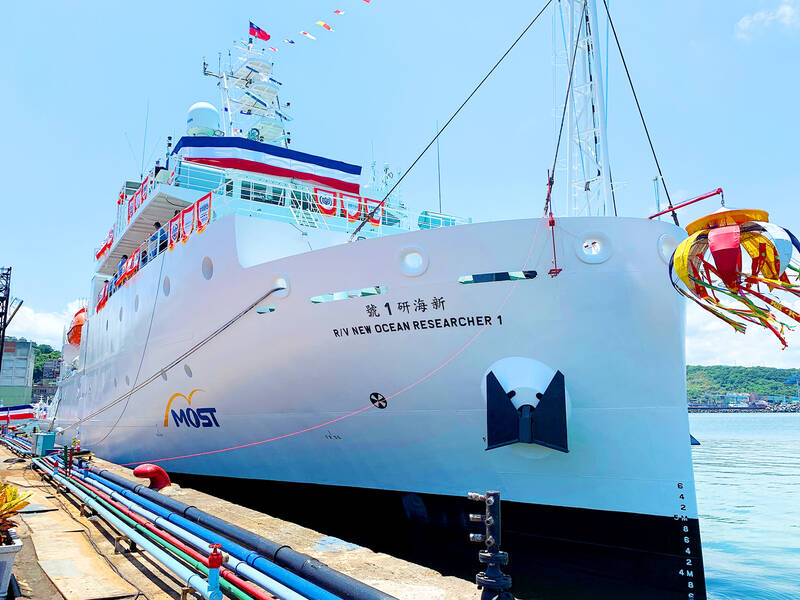The National Science and Technology Council said it would hold meetings with national security and coast guard officials before dispatching research vessels, after a legislator revealed that there have been 11 territorial conflict-related incidents involving research vessels over the past five years.
As Taiwan’s exclusive economic zone overlaps with those of other countries, including China and Japan, its research vessels are occasionally driven away by those countries’ coast guard ships.
At a legislative budget hearing on Wednesday, independent Legislator Huang Kuo-shu (黃國書) asked the council about its plan to handle harassment of research vessels.

Photo: Lin Hsin-han, Taipei Times
One incident occurred in late September when National Taiwan University-operated New Ocean Researcher 1 (新海研一號) was conducting research off eastern Taiwan, Huang said.
Believing it was operating in Japan’s exclusive economic zone, a Japanese coast guard ship issued a warning to the vessel, he said.
The Taiwanese coast guard sent its 500-tonne Hualien patrol boat as a precautionary measure, resulting in a 10-hour standoff, he added.
After the incident, the Chinese Ministry of Foreign Affairs made representations to Tokyo asking it not to interfere with “China’s research work,” Huang said.
Calling the incident “embarrassing,” Huang asked council Minister Wu Tsung-tsong (吳政忠) to respond, as well as restart the Taiwan-Japan Maritime Affairs Cooperation Dialogue.
Wu reiterated that China had no right to raise representations with Japan over the incident.
As a Taiwanese coast guard vessel arrived on the scene, Wu said he assumed that foreign affairs and national security personnel resolved the matter.
The annual Taiwan-Japan maritime dialogue has halted for nearly two years due to the COVID-19 pandemic, although it should restart now that the borders have opened, he added.
Huang said Taiwanese research vessels have been harassed by foreign ships 11 times over the past five years, citing council data.
In two incidents, the vessels were pursued by Chinese ships within 1 nautical mile (1.85km), he added.
Even a joint research project with the Philippines encountered harassment by Chinese ships, Huang said, adding that the Philippine government handled the issue.
Beijing’s increasingly aggressive gray area tactics have caused neighboring countries to raise their guard, affecting Taiwanese maritime research, Huang said, urging the government to review its navigation and notification mechanisms.
Wu said that incidents are not handled by the council alone, but in cooperation with the National Security Council, the coast guard and other agencies.
He vowed that that National Science and Technology Council would hold meetings with other agencies before research vessels are dispatched, to clarify the vessels’ tasks and procedures.

Taiwan would welcome the return of Honduras as a diplomatic ally if its next president decides to make such a move, Minister of Foreign Affairs Lin Chia-lung (林佳龍) said yesterday. “Of course, we would welcome Honduras if they want to restore diplomatic ties with Taiwan after their elections,” Lin said at a meeting of the legislature’s Foreign Affairs and National Defense Committee, when asked to comment on statements made by two of the three Honduran presidential candidates during the presidential campaign in the Central American country. Taiwan is paying close attention to the region as a whole in the wake of a

President William Lai (賴清德) has appointed former vice president Chen Chien-jen (陳建仁) to attend the late Pope Francis’ funeral at the Vatican City on Saturday on his behalf, the Ministry of Foreign Affairs said today. The Holy See announced Francis’ funeral would take place on Saturday at 10am in St Peter’s Square. The ministry expressed condolences over Francis’ passing and said that Chen would represent Taiwan at the funeral and offer condolences in person. Taiwan and the Vatican have a long-standing and close diplomatic relationship, the ministry said. Both sides agreed to have Chen represent Taiwan at the funeral, given his Catholic identity and

Chinese Nationalist Party (KMT) Chairman Eric Chu (朱立倫), spokeswoman Yang Chih-yu (楊智伃) and Legislator Hsieh Lung-chieh (謝龍介) would be summoned by police for questioning for leading an illegal assembly on Thursday evening last week, Minister of the Interior Liu Shyh-fang (劉世芳) said today. The three KMT officials led an assembly outside the Taipei City Prosecutors’ Office, a restricted area where public assembly is not allowed, protesting the questioning of several KMT staff and searches of KMT headquarters and offices in a recall petition forgery case. Chu, Yang and Hsieh are all suspected of contravening the Assembly and Parade Act (集會遊行法) by holding

Lawmakers from the Democratic Progressive Party (DPP) yesterday established a friendship group with their counterparts in Ukraine to promote parliamentary exchanges between the two countries. A ceremony in Taipei for the Taiwan-Ukraine Parliamentary Friendship Association, initiated by DPP Legislator Chen Kuan-ting (陳冠廷), was attended by lawmakers and officials, including Deputy Minister of Foreign Affairs Francois Wu (吳志中) and European Economic and Trade Office in Taiwan Director Lutz Gullner. The increasingly dire situation in Ukraine is a global concern, and Taiwan cannot turn its back when the latter is in need of help, as the two countries share many common values and interests,